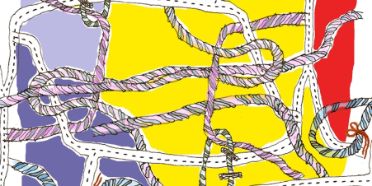- Research Project
REFPER - Reproductive Health. The perspective of refugee women
Women refugees in Switzerland face significant gaps in reproductive health care. Our research project focused on the views and experiences of affected persons and their needs. The "REFPER goes Society" project makes the research findings available to the public.
Factsheet
- Institute(s) Midwifery
- Funding organisation Andere
- Duration (planned) 01.03.2022 - 31.07.2024
- Head of project Milena Wegelin
-
Project staff
Milena Wegelin
Nour Abdin
Loraine Olalia
Beatrice Kaufmann
Tahmina Taghiyeva
Elif Gökalp
Fatma Leblebici
Saba Salomon
Laila Sarra -
Partner
Onedu
Cultural and social geography, University of Berne
Swiss Sexual Health (SGCH) - Keywords sexual and reproductive health, female refugees, family planning, contraception, reproductive justice
Current situation
The previous study REFUGEE (2017) conducted by the Bern University of Applied Sciences identified various obstacles,which prevent refugee women in Switzerland from accessing perinatal healthcare and demonstrated a gap in the available care related to family planning and contraceptions. Building on the insights oft he previous REFUGEE (2017) study, the REFPER research analyses refugee women’s perspectives on their experiences with reproductive health in Switzerland in general, and access to family planning and contraception in particular. The focus is on the individual needs of refugee women, which are shaped by their biographies and knowledge. This takes into account that the experiences of refugee women in the area of sexual and reproductive health are subject to a range of different socio-cultural and political forces.
Approach
The research project consists of four consecutive phases.
First phase: Determining the research fields
In a first step, experts from the health and migration sector as well as refugee women were interviewed about the social relevance of the research topic and possible research questions were discussed and defined.
Second phase: feasibility
In a second phase, the feasibility of the research project was tested in a five-month pilot project. In this pilot phase, the procedures for making contact with the refugee women as well as the interview setting and process were explicitly tested, reflected upon and adapted. An in-depth examination of the work and the role of interpreters in the research process led to the decision to employ an intercultural interpreter with refugee experience as a project member. In this way, a participatory research design was initiated and developed.
Third phase: Main study with six co-researchers with experiential knowledge
For the main study, it was supplemented by an accompanying group of six co-researchers with experience in the context of flight and asylum. The co-researchers supported the data analysis in the main study through regular group discussions.
Fourth phase: Making knowledge accessible
The fourth ongoing phase communicates research results using a participatory approach. In collaboration with the co-researchers, the project topic, the methodological approach and the central research results are made accessible to a broader public.
Impressions of the public event in June 2024
Publications & Lectures
Articles in English:
Publication Research Paper (German)
- Wegelin, M., Perler, L., Abdin, N., Sieber, C., Huber, L., Cignacco, E. (2024). REFPER Reproduktive Gesundheit – die Perspektive geflüchteter Frauen in der Schweiz.
- Report of the co-researchers: REFPER. Reproduktive Gesundheit – die Perspektive geflüchteter Frauen in der Schweiz.
Publications (German)
- Wegelin, M., Abdin, N., Sieber, C. (2024). «Reproduktive Gerechtigkeit im Fluchtkontext – Neue Perspektiven», In: Obstetrica 4/5.
- Metthez, C., Wegelin, M., Sieber, C. (2024).«Selbstbestimmte Familienplanung: Haben Geflüchtete Zugang zu Beratung?», In: Obstetrica 4/5.
- Metthez, C., Wegelin, M., Sieber, C. (2024). «Selbstbestimmte Familienplanung: Haben Geflüchtete Zugang zu Beratung?», long version
- Article in the journal FORUM Sexualaufklärung und Familienplanung des Informationsdiensts der Bundeszentrale für gesundheitliche Aufklärung (BZgA), 2023 (.pdf)
- Interview with Nour Abdin and Milena Wegelin in the journal of the Interdisciplinary Centre for Gender Studies (ICFG) at the University of Bern, «genderstudies», 2023 (.pdf)
- Article in the journal Public Health Forum, 2021
- Article in the journal «frequenz», 2021
Lectures (German)
- Lecture at the 6. Internationale Konferenz der DGHWi e.V. (28. Juli 2022 / Winterthur)
- Lecture and Workshop as part of the lecture «Reproduktive Gerechtigkeit» of the Interdisciplinary Centre for Gender Studies (ICFG) at the University of Bern
- Lecture at the Gosteli Gesprächen 2023 «Institutionelle Politiken der (Ab)wertung von Mutterschaft im schweizerischen Asylwesen». with Laura Perler, University of Bern (.pdf)
Media (German)
- Interview mit Nour Abdin und Milena Wegelin in der Zeitschrift des interdisziplinären Zentrums für Geschlechterforschung IZFG der Universität Bern «genderstudies», 2023 (.pdf)
- Radie RaBe, Sendung «Bi aller Liebi...», So kann und will ich nicht schwanger werden, 2023
Presentations (German)
- Vortrag an der 6.Internationale Konferenz der DGHWi e.V. (28. Juli 2022 / Winterthur)
- Vortrag und Workshops im Rahmen der Ringvorlesung «Reproduktive Gerechtigkeit» des interdisziplinären Zentrums für Geschlechterstudien (IZFG) der Universität Bern
- Vortrag an den Gosteli Gesprächen 2023 «Institutionelle Politiken der (Ab)wertung von Mutterschaft im schweizerischen Asylwesen». Zusammen mit Laura Perler, Universität Bern (.pdf)
Research collaboration
- Project «reproductive geopolitics», Cultural and social geography, University of Berne
Project team

Conference










